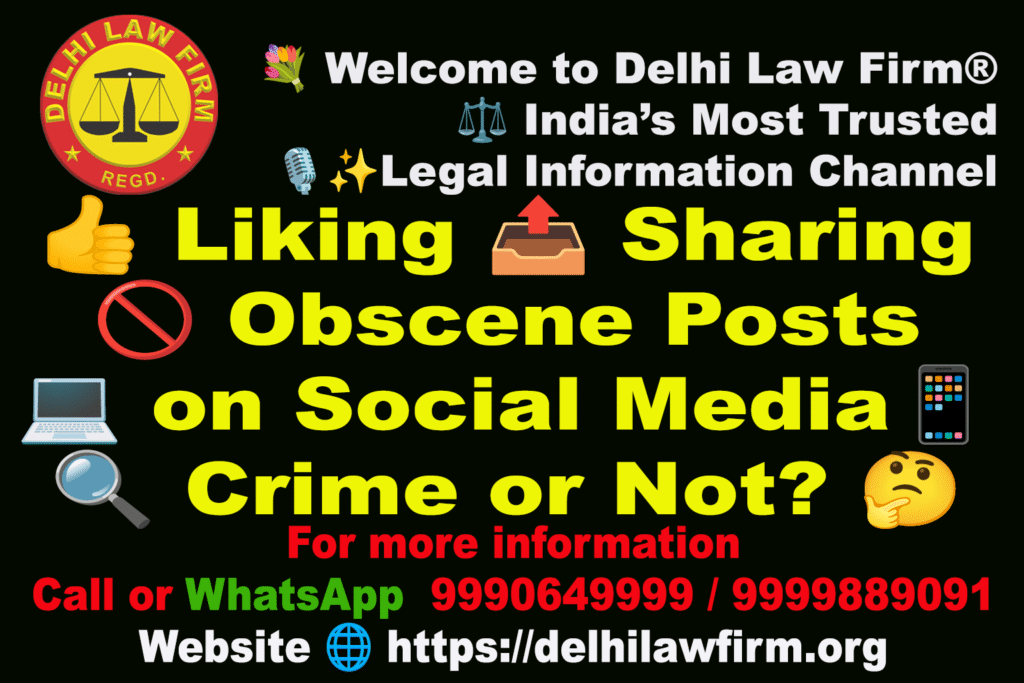आपका स्वागत है Delhi Law Firm में — आपका भरोसेमंद कानूनी साथी, जो डिजिटल युग में कानूनी जागरूकता लेकर आता है।
⚖️ परिचय
आज के समय में लगभग हर व्यक्ति सोशल मीडिया पर रोज़ किसी न किसी पोस्ट को लाइक, शेयर या कमेंट करता है।
लेकिन एक बड़ा सवाल यह है — क्या सिर्फ किसी अश्लील पोस्ट को “लाइक” करने से आप अपराधी बन सकते हैं?
क्या यह सूचना प्रौद्योगिकी अधिनियम, 2000 (Information Technology Act, 2000) के तहत दंडनीय है?
आइए इसे न्यायालयों के हालिया निर्णयों से समझते हैं।
📜 धारा 67 – सूचना प्रौद्योगिकी अधिनियम, 2000
इस धारा के अनुसार, कोई भी व्यक्ति जो किसी अश्लील सामग्री को प्रकाशित (publish) या प्रसारित (transmit) करता है, या करवाता है, उसे सजा और जुर्माने का सामना करना पड़ सकता है।
यहाँ मुख्य शब्द हैं “प्रकाशित” और “प्रसारित।”
यह कानून उन लोगों पर लागू होता है जो सक्रिय रूप से अपलोड, फॉरवर्ड या शेयर करते हैं — न कि उन पर जो केवल देखते या लाइक करते हैं।
⚖️ इलाहाबाद उच्च न्यायालय का निर्णय
Mohammad Imran Khan बनाम State of Uttar Pradesh में माननीय इलाहाबाद उच्च न्यायालय ने इस भ्रम को दूर किया।
अदालत ने कहा कि सिर्फ किसी पोस्ट को लाइक करना इसका अर्थ नहीं है कि आपने उसे प्रकाशित या प्रसारित किया।
“लाइक” करना केवल एक निष्क्रिय प्रतिक्रिया (passive reaction) है, प्रकाशन नहीं।
हालांकि, अगर कोई व्यक्ति अश्लील सामग्री को अपलोड, फॉरवर्ड या शेयर करता है, तो यह स्पष्ट रूप से धारा 67 के तहत अपराध है।
💡 लाइक और शेयर में अंतर
- लाइक: केवल एक व्यक्तिगत प्रतिक्रिया, जो आपके प्रोफाइल तक सीमित रहती है।
- शेयर: सामग्री को दूसरों तक पहुँचाना यानी प्रसारण करना — और यहीं से अपराध की शुरुआत होती है।
⚖️ सुप्रीम कोर्ट के ऐतिहासिक निर्णय
1. Aveek Sarkar बनाम State of West Bengal (2014):
सुप्रीम कोर्ट ने पुराने Hicklin Test को हटाकर Community Standards Test लागू किया और कहा कि हर बोल्ड या एडल्ट फोटो “अश्लील” नहीं होती। अश्लीलता का मूल्यांकन समाज के मौजूदा मानकों से किया जाना चाहिए।
2. Shreya Singhal बनाम Union of India (2015):
सुप्रीम कोर्ट ने धारा 66A को असंवैधानिक घोषित किया, जिससे ऑनलाइन अभिव्यक्ति की स्वतंत्रता (Free Speech) को मजबूत सुरक्षा मिली।
💬 इसका अर्थ आपके लिए
यदि आप किसी पोस्ट को केवल “लाइक” करते हैं — भले ही वह विवादास्पद या बोल्ड हो — तो आप धारा 67 के तहत अपराधी नहीं हैं।
लेकिन अगर आप किसी अश्लील सामग्री को अपलोड, शेयर या फॉरवर्ड करते हैं, तो यह दंडनीय अपराध है।
“लाइक” और “शेयर” के बीच का अंतर बहुत महत्वपूर्ण है — जैसे ही आप शेयर करते हैं, आप प्रसारण की प्रक्रिया में शामिल हो जाते हैं, और वहीं से कानून लागू होता है।
🧠 डिजिटल जागरूकता और जिम्मेदारी
भारतीय न्यायालयों का उद्देश्य अभिव्यक्ति की स्वतंत्रता और सामाजिक मर्यादा दोनों की रक्षा करना है।
कानून का मकसद निर्दोष उपयोगकर्ताओं को दंडित करना नहीं, बल्कि अवैध या अश्लील सामग्री के प्रसार को रोकना है।
याद रखें:
पोस्ट करने या शेयर करने से पहले सोचिए।
जागरूकता ही शक्ति है, और जिम्मेदारी ही आपकी सुरक्षा।
📞 कानूनी सहायता
यदि आपको कभी आईटी एक्ट की धारा 67 के तहत कोई नोटिस या साइबर शिकायत मिले, तो तुरंत पेशेवर कानूनी सलाह लें।
हेल्पलाइन: 9990649999 | 9999889091
जागरूक रहिए। जिम्मेदार रहिए। कानूनी रूप से सुरक्षित रहिए।

#CyberLaw #ITAct2000 #Section67 #SocialMediaCrime #AveekSarkar #ShreyaSinghal #HindiLaw #DigitalIndia #OnlineSafety #LegalAwareness #CyberCrime
